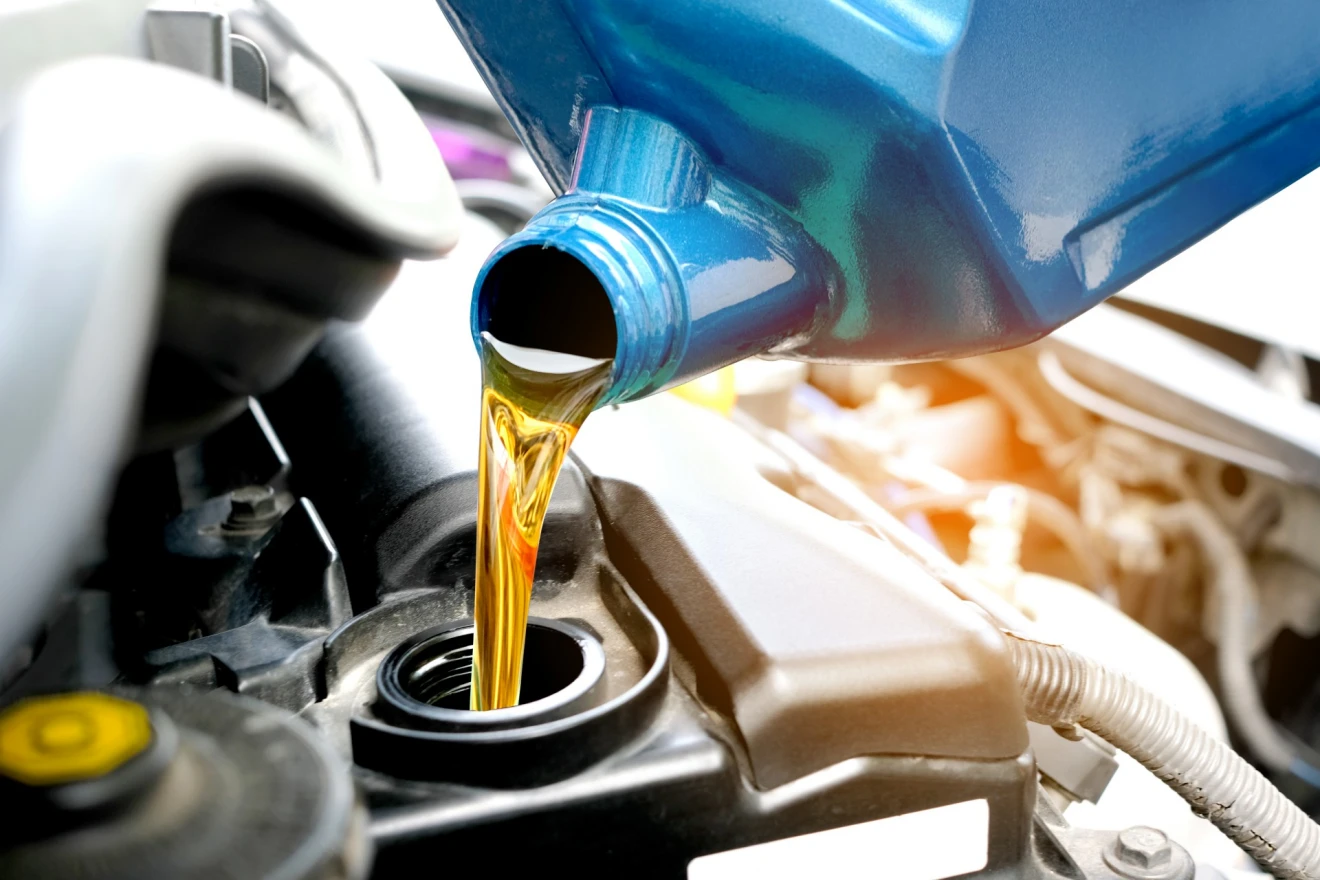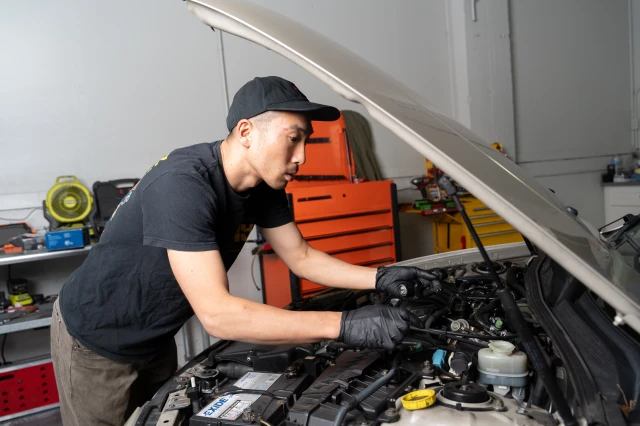
Oil Change:
Everything You Need to Know
Quick Facts
Price from: $130
Premium full synthetic oil + filter + labor
Time Needed
About 60 Minutes
Same-day service
No waiting for routine maintenance
Peace of Mind
Comprehensive warranty because quality work should last.
Bonus
Free visual inspection with photos included for free ($95 value)
Honest service
Repairs you need. Nothing you don't.
Our standards
At Clarity Auto Care, we do oil change right. We use only manufacturer-recommended synthetic oil, not cheap bulk alternatives. Our certified techs provide quality service, with photos to document every step. No rush jobs, no corners cut, no surprises—just top-tier care to protect your engine.
Why oil changes matter
Think of engine oil as your car's lifeblood. It's not just lubrication—modern synthetic oil is a sophisticated cocktail of base oils and additives designed to protect, clean, and cool your engine under extreme conditions.
Your engine operates at temperatures over 200°F with metal parts moving thousands of times per minute. Without proper oil protection, these components would literally weld themselves together from friction and heat.
Quality oil changes aren't just maintenance—they're insurance against catastrophic engine failure. Fresh oil with the right additives prevents sludge buildup, reduces wear, and can extend your engine's life by 100,000+ miles.
Long story short: premium oil changes = reliable transportation for years to come.
Skip them, and you're gambling with one of your most expensive investments.

Why Oil Quality and Proper Filter Matter
Not all oils and filters are created equal. Your engine's longevity depends on using the right grade of oil with proper filtration - and changing the filter every single oil change.
What affects your engine's health:
- Oil variety matters: Different engines require different oil viscosities and additive packages
- Filter quality: Premium filters capture smaller particles and last longer than basic alternatives
- Complete filter replacement: Old filters can't protect new oil - we replace it every time
- Proper oil grade: Using the wrong viscosity can cause inadequate lubrication
The cost of cutting corners
- Dirty oil creates engine sludge that blocks critical passages
- Worn filters allow contaminants to circulate through your engine
- Wrong oil grade leads to increased wear and potential failure
- Skipping filter changes means new oil gets dirty immediately
Remember:
A well-maintained engine with quality oil and fresh filters can last 200,000+ miles. A neglected engine working with dirty oil often needs major repairs by 100,000 miles.
At Clarity Auto Care:
We're committed to providing honest service, fair pricing, and quality repairs.
Quality Takes Time
We take the time your car needs, because rushing through maintenance puts your engine at risk.
Right Oil, Right Part, Right Car
We use manufacturer-approved parts and fluids - not generic alternatives. It's what your car was engineered for.
Guaranteed Repairs
12-month or 12,000-mile warranty on most services. Read the warranty terms
Expert Care
Our technicians aren't just trained - they follow detailed manufacturer guides for every make and model. They spot potential issues before they become expensive problems.
See Everything
After each service, you get a complete digital inspection with clear photos of your car's condition. No guessing what's happening under the hood.
Honest Service
We do exactly what your car needs - nothing more, nothing less. No pressure, no surprise add-ons. Just straightforward maintenance to protect your investment.
SAVE UP TO 30%*
with Clarity auto care
Repairs your car need and nothing you don't
*compared to the local dealer's price
Premium vs blended Synthetic Oil
Not all synthetic oils are the same. Many shops use generic synthetic formulations that meet basic industry standards, but your vehicle's manufacturer specifies exact oil requirements for optimal performance. Using a "one-size-fits-all" synthetic oil for every car is like using the same prescription for every patient — it just doesn't make sense.
Why Different Cars Need Different Oil Formulations:
- BMW and Audi turbocharged engines require oil with enhanced thermal stability and anti-coking properties
- Toyota and Lexus hybrids need low-viscosity oil that works efficiently with frequent engine start-stop cycles
- Mercedes AMG and high-performance engines require oil with specific additive packages for extreme operating conditions
- Honda and Acura VTEC engines need oil that maintains viscosity during high-RPM operation
- Ford EcoBoost and Nissan turbo engines require oil with enhanced oxidation resistance
- Volkswagen TDI diesels need oil with specific detergent and dispersant properties
The Science Behind Manufacturer Specifications:
Car manufacturers don't just pick oil specifications randomly. They spend millions testing different formulations under extreme conditions:
- Temperature testing: From -40°F cold starts to 300°F+ operating temperatures
- Endurance testing: 100,000+ mile durability trials with engine teardown analysis
- Emissions compliance: Oil must not interfere with catalytic converters or particulate filters
- Fuel economy optimization: Viscosity and friction modifiers affect MPG ratings
That's why manufacturers spend years testing and recommending specific oils for their engines. Each car is different, and each engine is designed to work best with certain oil formulations. At Clarity, we don't guess — we use exactly what your manufacturer recommends. It might cost a bit more, but it's what your engine was actually designed to run on. Think of it as giving your car exactly what it was engineered to use, not just what's "acceptable."
Oil Specifications and Filter Quality
Every bottle of oil has a specification code that tells you exactly what it's designed to do. These aren't marketing terms—they're precise engineering standards that determine whether the oil will protect your specific engine.
Common Oil Specifications Explained:
- 0W-20: Ultra-low viscosity for fuel economy and cold-weather protection (many newer cars)
- 5W-30: Most common specification, balances protection and efficiency
- 5W-40: Higher viscosity for turbocharged engines and extreme conditions
- 0W-16: Newest ultra-low viscosity for maximum fuel economy (Honda, Toyota hybrids)
Why Filter Quality Matters as Much as Oil:
Your oil filter isn't just a screen—it's a sophisticated component that must capture particles as small as 25 microns while allowing oil to flow freely. A premium filter can mean the difference between 200,000-mile engine life and premature wear.
- Filtration efficiency: Premium filters capture 95%+ of harmful particles vs 85% for basic filters
- Dirt holding capacity: Higher-quality filters hold more contaminants before restricting flow
- Construction quality: Better gaskets, media, and housing prevent leaks and failure
- Flow rate: Properly designed filters maintain oil pressure under all conditions
Remember:
Using the wrong oil specification can void your warranty and cause engine damage. A $10 difference in filter quality can prevent thousands in engine repairs. We use exactly what your manufacturer specifies—nothing more, nothing less.
When Do you need an oil change?
Most cars need fresh oil every 3,000 to 7,500 miles. Really depends on your car and how you drive it:
- Regular oil: Every 3,000 miles or 6 months
- Full synthetic: Every 7,500 miles or 12 months
- Whichever comes first
Not sure about your car? Just check your manual or ask us - we're here to help!
Quality service at fair prices
Complete auto care: from oil changes to engine swaps.